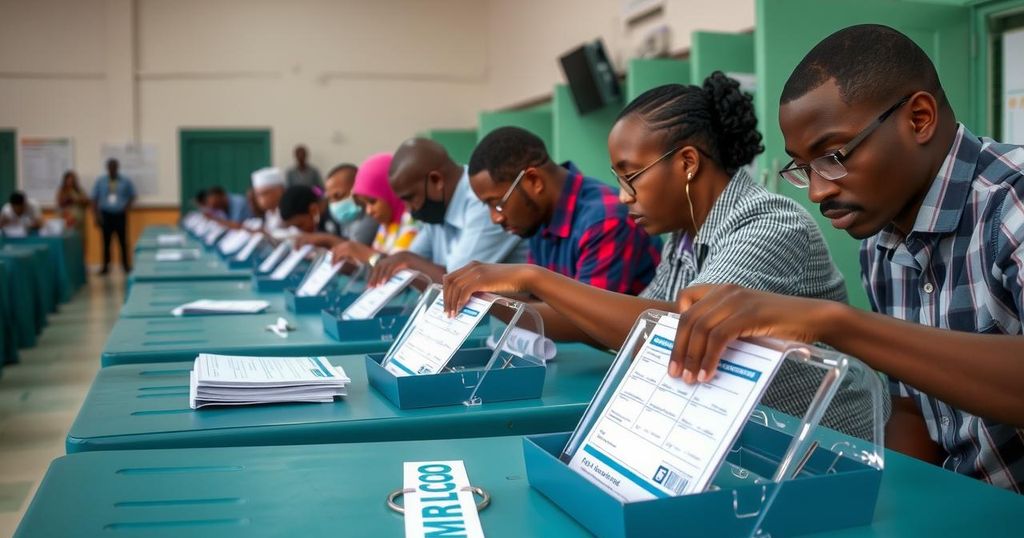World news
ABDALLAH SAMBI, AFRICA, AUSTRALIAN ASSOCIATED PRESS, AZALI ASSOUMANI, COMOROS, ELECTION FRAUD, GOVERNANCE, GOVERNMENT, HAMIDOU KARIHILA, HOPE OF THE COMOROS, INDIAN OCEAN, INDIAN OCEAN ARCHIPELAGO, JUWA, NO, NOUR EL - FATH, OPPOSITION, POLITICS, PRESIDENTIAL ELECTION, REUTERS, SUPREME COURT
Sofia Rodriguez
0 Comments
Comoros Parliamentary Elections Amid Allegations of Authoritarianism
Voters in Comoros are participating in parliamentary elections to fill 33 seats, amidst allegations of electoral fraud from the opposition regarding the previous re-election of President Azali Assoumani. Approximately 338,000 individuals are registered to vote, with nearly 100 candidates contesting the elections. Some parties have called for a boycott, while others advocate participation to highlight systemic flaws in the regime. Results are expected by Friday.
Voters in the Comoros are at the polls to elect representatives for the archipelago’s 33-seat parliament, following last year’s controversial re-election of President Azali Assoumani. The opposition has asserted that the previous elections were marred by significant irregularities, a claim the ruling party has vehemently denied. Polling stations opened early Sunday, with approximately 338,000 registered voters participating in the democratic process, a notable event since parliamentary elections had not occurred since January 2020.
The nation’s Supreme Court has validated nearly 100 candidates to compete for the parliamentary seats. Assoumani’s administration faces accusations of authoritarianism, with concerns raised regarding his intention to position his eldest son, Nour El-Fath, as a successor once his term concludes in 2029. Having been in power since a coup in 1999, Assoumani has since secured three electoral victories, including the last one. In a significant power shift, he recently entrusted his son with extensive authority over national government operations.
Some opposition factions, notably the Juwa party, led by former president Ahmed Abdallah Sambi—currently serving a life sentence—have advocated for a boycott of the elections. Conversely, other groups within the opposition maintain that participating in the elections could expose the regime’s inherent flaws. Hamidou Karihila, a candidate from the opposition party Hope of the Comoros, expressed, “The Azali regime is weakened … by participating in these elections we are contributing to further exposing the flaws in its system and accelerating its inevitable fall.”
Results from this election are anticipated by Friday, an outcome that will likely have significant repercussions on the Comorian political landscape.
The current elections in Comoros come amidst a politically charged environment characterized by allegations against the ruling party regarding electoral malpractice. President Azali Assoumani, who has held power since 1999 through both military and electoral means, has faced increasing scrutiny from various opposition groups. These groups argue that his regular victories may not truly reflect the will of the people, particularly in light of their claims of systematic repression and authoritarian rule. The involvement of Assoumani’s son in government affairs raises further concerns regarding dynastic politics, which may undermine democratic governance in the archipelago.
In conclusion, the parliamentary elections in Comoros represent a critical moment for the nation’s political future. Amidst allegations of authoritarianism and calls for electoral abstention from some opposition groups, many citizens are actively participating in the democratic process. The outcome of this election will undoubtedly influence the discourse surrounding governance and democratic practices in Comoros, particularly given the backdrop of the ruling party’s controversial practices and claims of electoral misconduct.
Original Source: www.naroomanewsonline.com.au




Post Comment